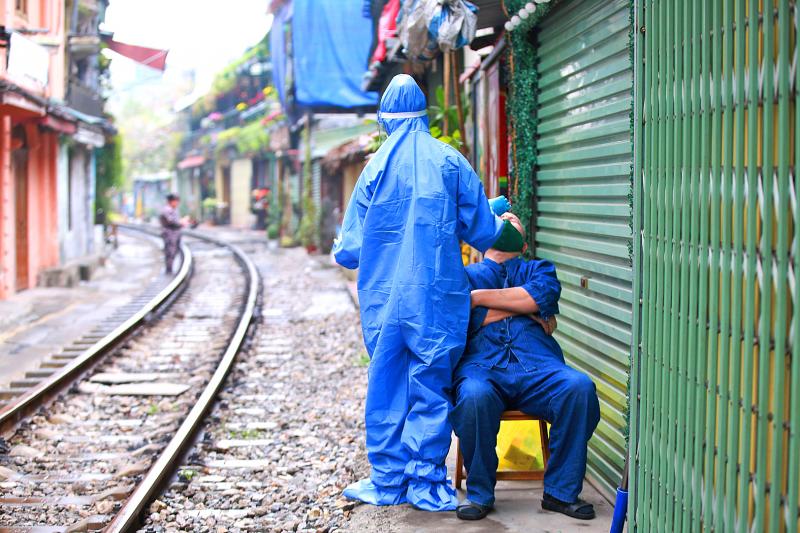Emerging economies should gird for possible rough times as the US Federal Reserve prepares to raise interest rates and world economic growth slows because of the Omicron variant of SARS-CoV-2, the IMF warned yesterday.
The IMF, which is scheduled to release updated economic forecasts on Jan. 25, said that the global economic recovery from the ravages of the COVID-19 pandemic should continue this year and next.
However, “risks to growth remain elevated by the stubbornly resurgent pandemic,” IMF economists Stephan Danninger, Kenneth Kang and Helene Poirson wrote in a blog post.

Photo: EPA-EFE
The highly contagious Omicron strain has spread like wildfire around the world since the middle of last month, causing record numbers of new COVID-19 cases in the latest wave of the global health crisis.
Omicron, which seems to cause less severe disease than previous strains of the virus, is causing countries to reinstitute health measures that hamper economic growth.
“Given the risk that this could coincide with faster Fed tightening, emerging economies should prepare for potential bouts of economic turbulence,” the economists said, as these countries are also confronting elevated inflation and substantially higher public debt.
The Fed has signaled that it would raise key interest rates sooner and more aggressively than it had planned, to counter rampant inflation in the US that is hitting US households and consumption — the engine of economic growth in the US.
Higher interest rates mean financing costs for some emerging economies with US-dollar-denominated debt would rise. The countries are already lagging behind in the global economic recovery and thus less able to absorb added expenditure.
“While dollar borrowing costs remain low for many, concerns about domestic inflation and stable foreign funding led several emerging markets last year, including Brazil, Russia and South Africa, to start raising interest rates,” the IMF said.
Quicker Fed rate hikes could rattle financial markets and cause tighter financial conditions on a global scale, the blog said.
The risk is that there would be a slowing of demand and trade in the US, as well as capital flight and a depreciation of the dollar in markets of emerging countries.
The IMF recommended that emerging economy nations “tailor their response based on their circumstances and vulnerabilities.”
Central banks that are raising interest rates to fight inflation should engage in “clear and consistent communication,” so people better understand the need for price stability, the international lender said.

HANDOVER POLICY: Approving the probe means that the new US administration of Donald Trump is likely to have the option to impose trade restrictions on China US President Joe Biden’s administration is set to initiate a trade investigation into Chinese semiconductors in the coming days as part of a push to reduce reliance on a technology that US officials believe poses national security risks. The probe could result in tariffs or other measures to restrict imports on older-model semiconductors and the products containing them, including medical devices, vehicles, smartphones and weaponry, people familiar with the matter said. The investigation examining so-called foundational chips could take months to conclude, meaning that any reaction to the findings would be left to the discretion of US president-elect Donald Trump’s incoming team. Biden

INVESTMENT: Jun Seki, chief strategy officer for Hon Hai’s EV arm, and his team are currently in talks in France with Renault, Nissan’s 36 percent shareholder Hon Hai Precision Industry Co (鴻海精密), the iPhone maker known as Foxconn Technology Group (富士康科技集團) internationally, is in talks with Nissan Motor Co’s biggest shareholder Renault SA about its willingness to sell its shares in the Japanese automaker, the Central News Agency (CNA) said, citing people it did not identify. Nissan and fellow Japanese automaker, Honda Motor Co, are exploring a merger that would create a rival to Toyota Motor Corp in Japan and better position the combined company to face competitive challenges around the world, people familiar with the matter said on Wednesday. However, one potential spanner in the works is

In a patch of South America rich in lithium, used to make batteries for electric cars and other tech, Bolivia is lagging its neighbors in the race to mine the key metal. An area called the “lithium triangle” which spills over the borders of Bolivia, Chile and Argentina is home to 60 percent of the world’s lithium reserves, according to the US Geological Survey. Bolivia claims to have Earth’s largest deposit of the metal, used to make rechargeable batteries for smartphones, laptops and other devices besides e-vehicles. However, Bolivia has undertaken only four pilot projects and is running just one

HON HAI LURKS: The ‘Nikkei’ reported that Foxconn’s interest in Nissan accelerated the Honda-merger effort out of fears it might be taken over by the Taiwanese firm Nissan Motor Co has become the latest buyout target in Japan as it explores a merger with Honda Motor Co and faces an overture from Hon Hai Precision Industry Co (鴻海精密), known as Foxconn Technology Group (富士康科技集團) internationally. Shares in Nissan yesterday jumped 24 percent, the most on record, to hit the daily limit, after the two Japanese automakers acknowledged that talks are ongoing to better position themselves for competitive challenges during a time of upheaval in the global auto industry. Foxconn — a Taipei-based manufacturer of iPhones, which has been investing heavily in factories to build electric vehicles — has also